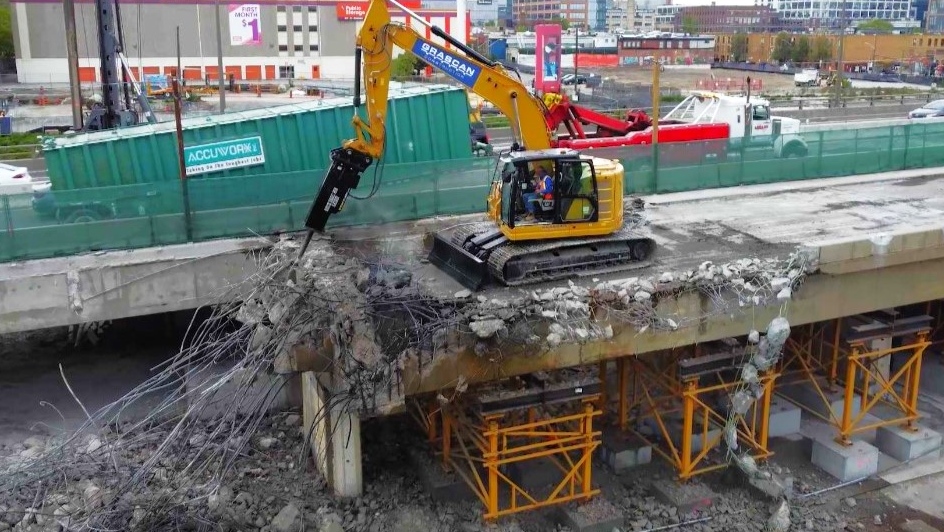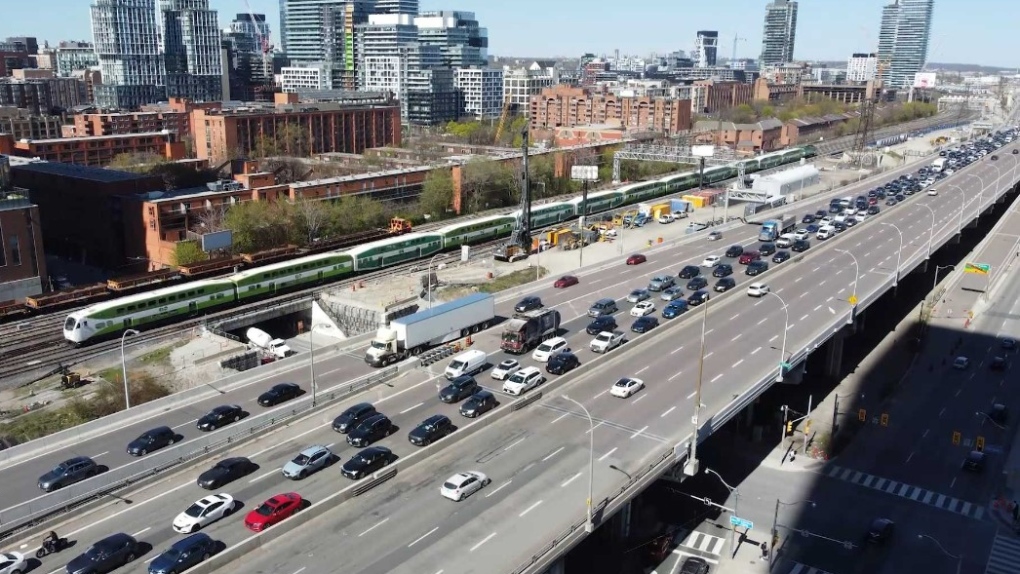In the final report of a three-part series on Gardiner Gridlock, CTV Toronto asks what more can be done to alleviate the impact of the construction that has been a tipping point for Toronto traffic.
Part 2: A blow to business: Lane restrictions undercut productivity in costly commute
It’s just after 6 p.m. on a Thursday and Fezz Barbhuiya is leaving his Canary District job – hoping to make it home by 8.
“It used to take me about an hour, an hour and 15 minutes to get home,” Barbhuiya says as he climbs in the car. “Right now that is up to an hour 45, or two hours is not out-of-the-ordinary at all.”
It all changed in mid-April when the Gardiner underwent major lane restrictions between Dufferin St. and Strachan Ave. and Barbhuiya’s commute went from bad to worse. The bottleneck at each end of the 700-metre stretch affects 200,000 drivers a day, according to the City.
For Barbhuiya, the one thing worse than spending up to four hours in the car each day to-and-from Burlington is seeing roadside construction equipment sit idle while he is crawling along.
“What is frustrating for me, is in the morning when I’m coming in, and the lanes that are shut down, nobody’s working there,” he said. “Same thing in the evening … thousands of people, we’re together in this, and I look over and not a soul working on these sections.”
With three years of construction ahead, his question is why the critical roadwork ever sits at a standstill along with the traffic – why it isn’t happening 24/7.
“I think we should have looked at extended hours of construction,” Giles Gherson, president of the Toronto Region Board of Trade, told CTV Toronto. “I think that’s critical. I mean, we’ve seen it in other cities.”
“I’ve heard some people say it’s going to take three years to do a one-year project.”
Around-the-clock work is permitted under the project’s contract, a city spokesperson told CTV Toronto, but the primary hours of construction are 7 a.m. to 11 p.m. Monday to Saturday, with “occasional” work on Sundays and overnight. Noise complaints generated by previous Gardiner construction on the stretch between Cherry St. and Jarvis St. were a factor in the decision, staff said.
“Currently, the Contractor undertakes overnight work as and when needed, including tasks that are quieter or depend on specific conditions,” the City said in a statement.
But as the impact on traffic becomes increasingly clear, calls are mounting to pick up the pace.
“Often it’s equipment sitting on the side of the road with a bunch of pylons around it,” Toronto Councillor Brad Bradford told CTV Toronto.
“We need to push harder on the 24-7 construction. I want that construction equipment working around the clock to make sure that we can get this done as quickly as possible,” he said. “It doesn’t need to be a three-year project, it needs to be done faster.”
 Toronto’s Gardiner Expressway is undergoing major lane restrictions between Dufferin St. and Strachan Ave. (CTV News)
Toronto’s Gardiner Expressway is undergoing major lane restrictions between Dufferin St. and Strachan Ave. (CTV News)
“There are strategies to accelerate construction,” Matti Siemiatycki, the director of the University of Toronto’s Infrastructure Institute, explained.
The challenge is, he said, they don’t come cheap.
“You can go 24 hours a day. You can do off-site construction for certain types of projects, that’s been used in other jurisdictions. But there’s also a trade-off between time and cost. And the city’s also facing a huge budgetary challenge. So how they go about doing things to try to speed these projects up that have costs … we’re always weighing that.”
Contractor crews working on the project tell CTV News that more nearby real estate would be needed to make more pre-fabrication logistically possible. Timing the work around the 2026 FIFA World Cup – when all lanes will be temporarily reopened – further complicates the construction schedule.
“We are bringing in experts to look at ways on how we could rebuild it faster,” Toronto Mayor Olivia Chow said. “We are hoping to speed up the construction as much as we can.”
Chow stressed that much of the current work is being done underneath the expressway, so the progress may not be visible to drivers traversing the stretch.
The City has retimed 60 traffic signals in the area, and is considering deploying more traffic agents in strategic spots, according to Roger Browne, Toronto’s director of traffic management.
“From my perspective, we’re doing everything we can from a traffic management perspective to keep traffic moving as fluidly as we could,” he said.
Asked about the impact of the Gardiner construction at a press conference Wednesday, Ontario’s transportation minister pledged support for speeding up the schedule
“I know the disruption that is has caused, as I travel on it every single day,” said Prabmeet Sarkaria, who represents Brampton South. “So we are committed to doing anything and everything to help support the increased timelines on getting that completed.”
 The Gardiner Expressway in Toronto can be seen above. (CTV News)
The Gardiner Expressway in Toronto can be seen above. (CTV News)
Barbhuiya, meanwhile, now drives into the core ahead of the peak morning rush and then works unpaid overtime to delay the drive back to Burlington – bracing for three-years of daily disruptions.
“200,000 lives on a daily basis, and that’s just direct people that we’re talking about. What about the impact on their families?” he said.
“I am simply absolutely exhausted from the drive.”